14
Fordson Tractor with Threshing Machine in front of Kilby Horse Barn20th Century, Circa 1930
Kilby Historic Site, Harrison Mills, British Columbia, Canada
 Credits:
Credits:Fraser Heritage Society
15
The family survived the winters of 1948 and 1949, but things really became difficult in the Spring of 1950. Around the Fall of 1949, the farm operation had to convert to artificial insemination, because the regular production of calves was the heartbeat of the farm. Without calves, there would be no milk, and without milk, there would be no income. The farm had a man working for it who was responsible for monitoring the good health and growth of the herd. Everything seemed to be going well, but sometime in the Spring of 1950, a dead calf was found. The veterinarian was immediately sent for. Turns out the insemination procedure had not been properly sterilized or monitored and the cows had been infected with a disease which caused them to abort.16
Kilby Cow Barn with First Nations People Helping to Clear Snow from Roof20th Century, Circa 1936
Kilby Historic Site, Harrison Mills, British Columbia, Canada
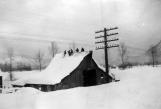 Credits:
Credits:Fraser Heritage Society
17
For the Kilby family going into massive debt to build new barns, replace obsolete machinery and weather out the period when the bulk of our cows would not be producing milk was just not feasible. The cattle were registered purebreds, certified TB Free, and they were still in considerable demand as the Holstein breed had not yet come to dominate the Fraser Valley dairy scene. The only answer was to sell them. Within a year, all of the cattle were gone.Many went to Fraser Valley farms, some went to Argentina, and others were sent to California and Ontario. One of the last cows to go was Peter Kilby's prize heifer from the 1948/1949 Calf Club. She was in calf and went to an Ontario farm.
18
Kilby Farm - Water Tower, Horse Barn, Shed and Cow Barn Looking East20th Century, Circa 1940
Kilby Historic Site, Harrison Mills, British Columbia, Canada
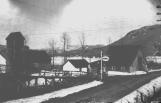 Credits:
Credits:Fraser Heritage Society
19
The Kilby's also sold the work horses, but they kept a couple of saddle horses and, one winter, boarded about 18 trail ride animals from the Harrison Hot Springs Hotel. The farming operation wound up, and Peter Kilby's recollection is that all of the livestock was gone by the Spring of 1951. The cow barn was dismantled around late 1951 and early 1952.20
Peter Kilby, son of Acton and Jessie, on Cart Horse in front of Cow Barn20th Century, Circa
Kilby Historic Site, Harrison Mills, British Columbia, Canada
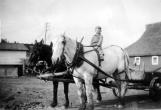 Credits:
Credits:Fraser Heritage Society
21
With the closing of the farm, Acton and Jessie shifted their focus toward running the General Store and Acton continued to work for the Milk Shippers Agency until around 1959 when the agency closed down due to changes in provincial regulations.22
Farm Workers in Field on the Waterloo Farm20th Century, Circa 1920
Kilby Historic Site, Harrison Mills, British Columbia, Canada
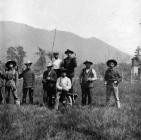 Credits:
Credits:Fraser Heritage Society
23
Harsh winters were experienced on the Waterloo Farm. Family and farm workers would have to climb up on the roofs of the barns to clear off the heavy snow.24
Winters could be long and hard and roads sometimes impassible.25
Kilby Cow Barn, Oil Shed and Gas Pumps20th Century, Circa
Kilby Historic Site, Harrison Mills, British Columbia, Canada
 Credits:
Credits:Fraser Heritage Society
26
The devastating flood of 1948 had a huge impact on the farm.27
Kilby Waterloo Farm - Water Tower with Threshing Machine during 1948 Fraser River20th Century, Circa 1948
Kilby Historic Site, Harrison Mills, British Columbia, Canada
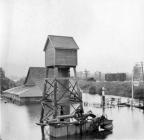 Credits:
Credits:Fraser Heritage Society